I Dig Sports
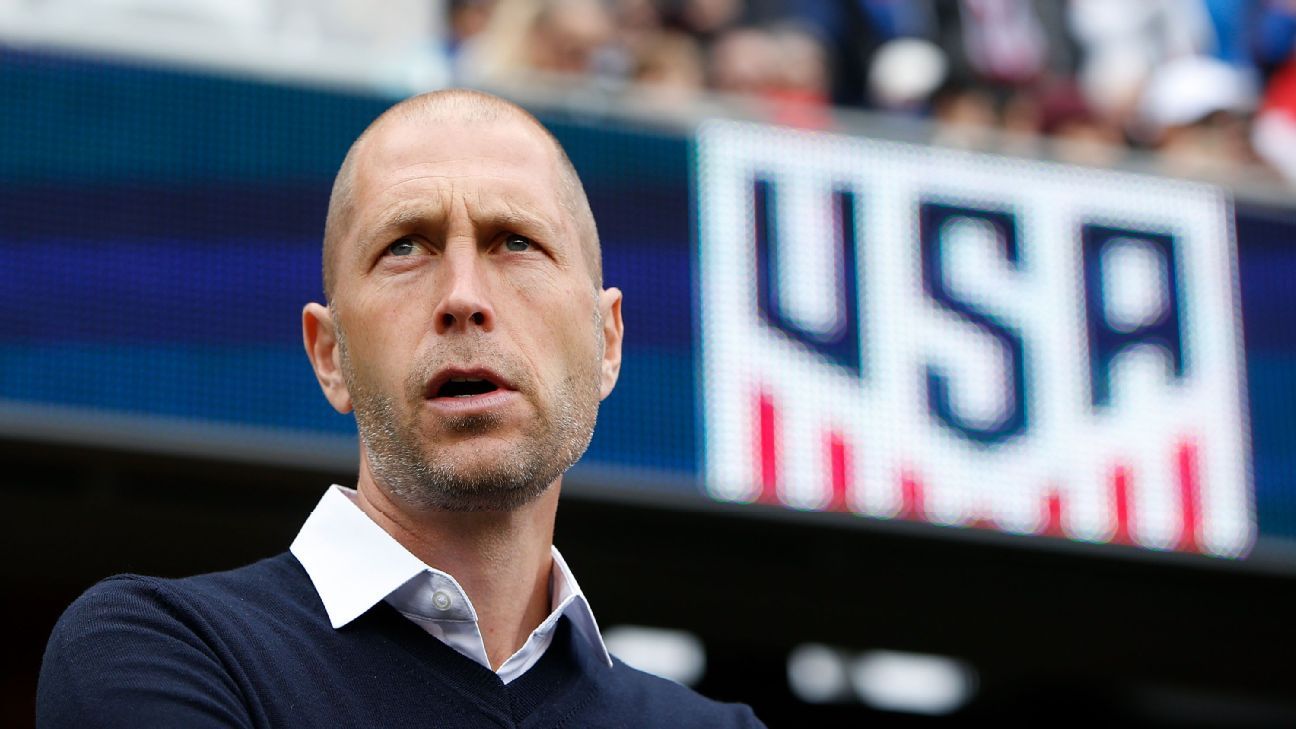
ANNAPOLIS, Md. -- Few training venues are as picturesque as the one the U.S. men's team has graced over the past week.
The Americans have been practicing at the Glenn Warner Soccer Facility on the campus of the U.S. Naval Academy. The field overlooks the Severn River. As such, there are any number of boats nearby, including a pair of Navy training vessels docked within hailing distance of the facility.
One can feel the history oozing from every pore of the place and the fact that the players began the current camp on Memorial Day helped set the proper tone.
"To be training here at the U.S. Naval Academy, it's really amazing," defender Omar Gonzalez said. "It just really makes me proud to wear the jersey, to see these servicemen and women, doing what they do for our country, and here we are about to step on a soccer field to represent our country."
Gonzalez's sentiments were echoed by goalkeeper Zack Steffen, though the former Maryland Terrapin was having some unpleasant flashbacks as well.
"I remember we came here my sophomore year and we lost 2-1," Steffen said. "But other than that it's great to be back in Maryland in a familiar part of town. Annapolis is a beautiful city and the Naval Yard is fantastic. We're on the water, it's a beautiful day, you can't complain."
- When is the CONCACAF Gold Cup?
- Full Gold Cup fixtures schedule
Yet as unique as the facility is, it has plenty in common with venues that manager Gregg Berhalter has chosen in previous camps, namely a locale that is a bit off the beaten path, and where little time is spent shuttling from hotel to practice and back.
Back in January, Berhalter opted for the relative seclusion of the Elite Athlete Training Center in Chula Vista, California, instead of the usual drill of using the facilities at Dignity Health Sports Park up the road in Carson. Last March, the team convened at the Champions Gate facility that is 30 miles southwest of Orlando City Stadium, where the U.S. played Ecuador.
In this instance, prying eyes have been kept to a minimum as well. With parking at a premium, and security tight, attending practice as a media member required taking a 10-minute shuttle ride from the USNA's football stadium.
All of this is precisely how Berhalter likes it. Even the routine for the run-up to the game has been altered. Previous U.S. coaches followed the norm of practicing in the game venue on the day before the match, the better to familiarize the team with the surroundings. Not so under Berhalter. Prior to both the Ecuador and Chile games back two months ago, Berhalter eschewed practicing in the stadium, opting instead for the greater efficiency of a quick jaunt to the practice field.
None of this is a surprise to Steffen, who played under Berhalter for two seasons with the Columbus Crew.
"He's just a true professional," Steffen said about Berhalter. "He wants little distraction, he knows what we're here for. I think being secluded and closer to the guys, where the guys have to interact more with each other, I think that just builds the chemistry of the team. We don't have a lot of time together, so I think this is his way of team bonding. He's very much into team bonding."
That team-building process, both on and off the field, is now poised to accelerate. The previous two weeks served as an "integration camp" that involved taking a look at Gold Cup players, players from the U23 team, as well as some other fringe performers. Now the camp has moved to the next phase, with more of the Gold Cup provisional roster -- from MLS and from overseas -- having arrived.
Progress is no doubt needed. While Berhalter has been in charge since December, this is only the third camp he has held. Such is the plight of national team coaches given the club commitments of the players. There has been an air of expectation surrounding the two previous camps. What style would Berhalter adopt? What players would get called in? With the Gold Cup approaching, the stakes are rising. The U.S. will not only be expected to win, but win well. And given the number of no-shows and injuries within the ranks of rivals Mexico, an argument could be made that the U.S. is the favorite to take the trophy.
Of course, first up are a pair of friendlies against Jamaica on Wednesday, followed by a match against Venezuela on June 9. Based on Berhalter's comments at the start of training camp, the Jamaica match will see more experimentation, and as a reward for those players who have survived the first week of camp. The Venezuela game, "should look more like the Gold Cup roster," he said.
The second friendly, and the subsequent Gold Cup, will be the real test in determining if Berhalter's methods are taking root.
Tagged under
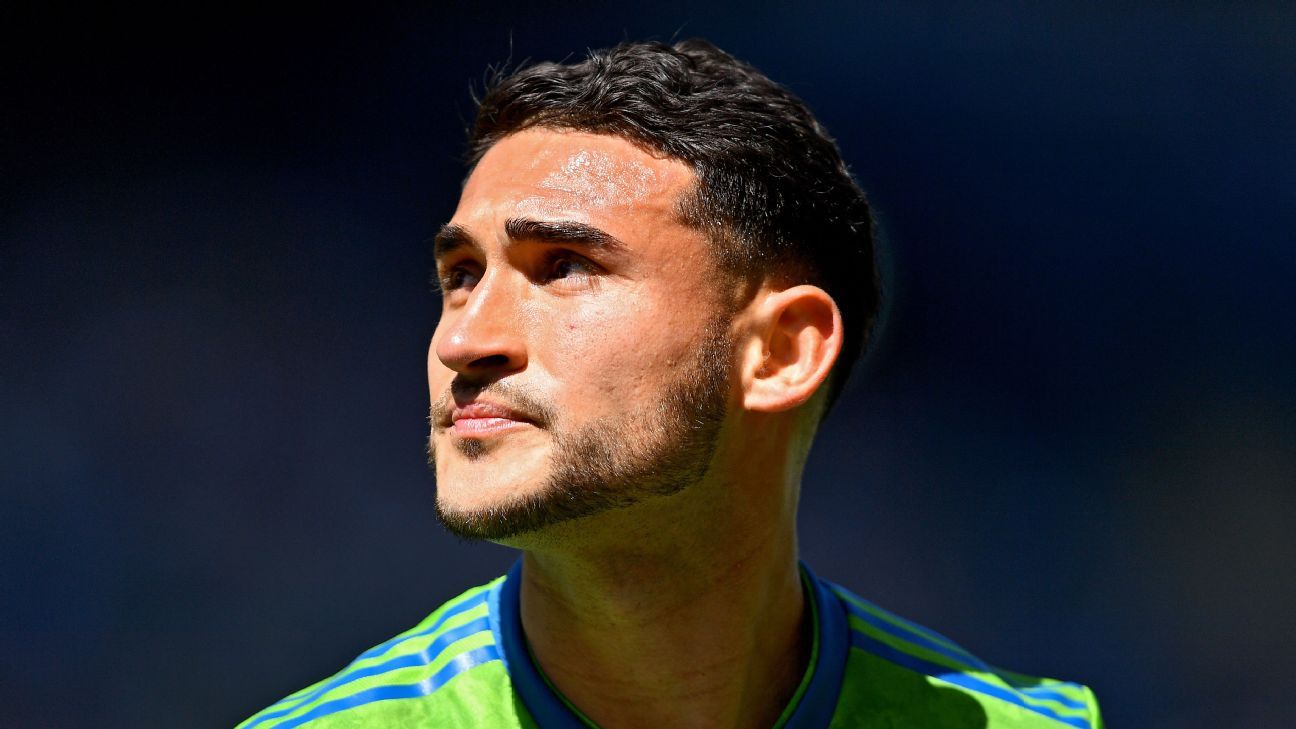
ANNAPOLIS, Md. -- As Gold Cup warm-ups go, Wednesday's friendly against Jamaica is shaping up to be the tuneup before the tuneup for the United States men's national team.
The bulk of the U.S. roster just arrived over the weekend, giving most of the players just two training sessions to prepare for the match. Linchpins Christian Pulisic and Tyler Adams won't even be available, as the duo won't meet up with their international teammates until Thursday and next Tuesday, respectively.
The fact that neither player will be included doesn't exactly get the blood boiling, but that is just fine with U.S. manager Gregg Berhalter. One player's absence is another's opportunity, especially with Berhalter set to name his Gold Cup roster after Wednesday's encounter. And while it might disappoint some fans eager to see the first-choice U.S. lineup, it will provide an opportunity for Berhalter to establish some depth. The subsequent friendly against Venezuela on Sunday will look more like Berhalter's preferred American starting 11.
The most intriguing choice for Berhalter on Wednesday is who will replace Pulisic in the lineup. Finding an additional creative option remains a priority for the U.S. manager. Most of the options scream more No. 8 than No. 10, though Berhalter didn't sound too stressed about the challenge at Tuesday's news conference.
- Tyler: Welcome to the summer of soccer!
- Carlisle: Gold Cup will measure first real results of Berhalter's influence
"In terms of those positions, offensively they operate pretty similar in terms of we want them in the pocket, we want them turning, we want them activating the winger," Berhalter said.
He later added: "I think it's a system game that we play, and Christian has a role in that system.
"He may be able to execute his role better than others, but others can fit into the system as well."
Sebastian Lletget was thought to be an option, but a hamstring injury sustained the LA Galaxy's 2-1 defeat to the New England Revolution last weekend will likely render him unavailable. That leaves one of Cristian Roldan, Djordje Mihailovic or Duane Holmes to occupy an advanced role in tandem with Weston McKennie.
Both Roldan and Mihailovic have made inroads with the national team since the start of the year. Roldan has offered a steadier, two-way presence. When the U.S. midfield looked like it was about to be overrun in the March draw against Chile, it was Roldan who helped solidify things.
"Being able to create a little bit more, that's usually Pulisic's job," Roldan told ESPN FC. "In my position with the national team, it's a little bit more of a hybrid between a No. 10 and a No. 6.
"But when I'm in that spot, in those soft pockets, being able to turn and make an impact on the game offensively is what I'm looking for."
Mihailovic has more attacking upside, and made a positive impression in a 3-0 victory against an overmatched Panama side in Berhalter's debut in January.
"Whenever I have an opportunity to get called into camp, I take it the same way, no matter the circumstances around it," he said in an exclusive interview.
"It's an opportunity for me to show what I can provide for the team and what Gregg is looking for out of me. It's an opportunity where whether it's the No. 10 or the No. 8, I have to play the same way whether Christian is here or not."
Holmes is the wild card, given that this is his first call-up to the U.S. team. His lack of familiarity with Berhalter's system makes a start unlikely, though for the U.S manager, Holmes' versatility is intriguing.
"He's one of those Weston McKennie-type of players where you can put him anywhere on the field and he can hold his own," Berhalter said of Holmes.
An opportunity beckons for right-back Nick Lima as well. Not only is Adams getting some rest, but hernia surgery has rendered DeAndre Yedlin unavailable for the summer as well. So regardless of whether Berhalter opts to assign Lima the hybrid right-back/central midfield role or something more conventional, the San Jose Earthquakes defender figures to get at least some playing time.
Lima has proved himself adaptable in recent months for club and country. He has been filling in at left-back for San Jose lately after beginning the season on the right.
"I'm going to prepare even if [I'm asked] to play goalie," Lima joked, before acknowledging that jumping from one flank to the other has its challenges.
"Being on the left, it's a lot different than what people expect.
"Instinct with the right, that's one thing. Instinct with the left, that's another to be built upon. It's a challenge, but that's what I enjoy and that's what I'm trying to improve all the time. I'm kind of forgetting what foot I am right now."
Jamaica should provide some ideal preparation for U.S. group opponents Guyana and Trinidad and Tobago. The Reggae Boyz are experienced and plenty mobile. Jamaica has also found its best results in and around the Gold Cup, reaching the final in the past two tournaments.
"We see it as a good opportunity for this group," Berhalter said. "We also realize that it's not going to be easy, things won't always go our way and we're prepared to deal with that."
For those players who can manage Wednesday's challenges best, a spot on the Gold Cup roster lies ahead.
Tagged under
Rabada, Bumrah, and a tale of two terrific spells
Published in
Cricket
Wednesday, 05 June 2019 12:44
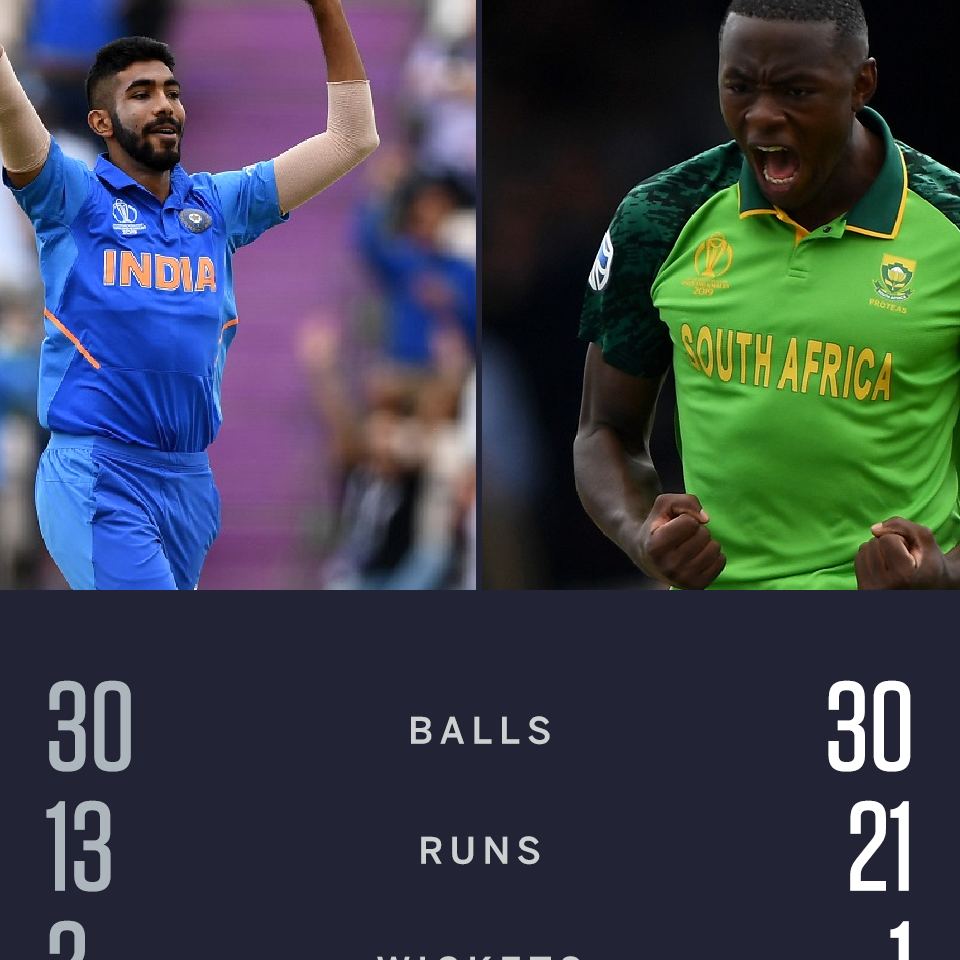
On Tuesday, Dale Steyn left the World Cup without bowling a ball. It was unfortunate to say the least, irrespective of your loyalties. Only because the World Cup is the platform to witness the best, and their battles against the best. That, however, hasn't left the World Cup bereft of top-of-the-line fast men. Leading that contingent are Kagiso Rabada and Jasprit Bumrah, two young pacers, who have the skills and the brains to intimidate batsmen. If you need proof of that, just revisit their opening spells on Wednesday.
Let's start with Rabada, it was the more eventful - though perhaps not as impactful - as Bumrah's.
Rabada shakes and stirs the Indian top order
On Tuesday afternoon, Rabada playfully engaged in a roaring contest with teammate Chris Morris. Both men let their emotions out by roaring as loudly as possible. For a tiny moment, Rabada's face, glistening with sweat, revealed a sense of joy, a sense of unbridled and uninhibited excitement that is at the core of his craft.
Emotions, Rabada told The Cricket Monthly recently, can transform a bowler into a dangerous beast, equipping his bow with that extra, intangible string, that can pierce the batsmen's mind and defence.
Today, Rabada must have been angry even before he lined up to deliver the first ball. South Africa's batsmen had disappointed for the third match in succession - they scored 227 for 9. The absence of Steyn and Lungi Ngidi (hamstring injury) meant Rabada had more on his plate than he might have otherwise.
From the crowd's point of view, the match-up the fans were looking forward to was Rabada v Virat Kohli. The past contests had already witnessed enough needle between them. Today's match-up became a notch bigger because of Rabada's remarks concerning Kohli's unapologetic, intense attitude on the field, which he said had left him to wonder whether the Indian captain was "immature". Kohli responded too.
Rabada warmed up for Kohli with a beauty of a first over, by the end of which he should have got both Shikhar Dhawan and Rohit Sharma out nicking off, both pushed back into uncomfortable positions when playing their shots.
By the end of the over, Rabada was roaring. Far from being one of delight, it expressed disgust and disappointment at the close-in fielders failing to get their hands under the top edges. Rabada would return to up the ante in terms of speed, catching Rohit on the hop more than once. Rohit was attempting to connect as far as possible on the front foot with Rabada pitching on a length. However, he was beaten both for pace and the bounce Rabada generated off short-of-length and length areas form the Pavilion End. Rabada finished the over with a yorker-length delivery that dipped in to Dhawan, and broke the toe end of his bat. Rabada could only stare at the flying chip of wood.
Rabada was now his element. The batsmen were shaken and stirred. First ball of his third over, he angled one off the seam, pitching it on length. It was the kind of delivery James Anderson had troubled the Indian batsmen with in the Test series last year, beating the outside edge several times. Rabada did not beat the edge, he caught it. Dhawan walked back.
The moment of the World Cup arrived, as Kohli walked each of the 45 steps down to the pitch from the dressing room. Kohli quickly took guard. Flicked the bat. Bent his head, raised it, waited. Rabada ran in and banged in a 91mph bouncer. Kohli ducked his first ball of the World Cup. A roar went around the ground. The next ball was a full toss. Kohli's bat face turned inwards on impact.
Kohli wanted to get off strike. Rabada suffocated him with speed and accuracy. There were no stares or words yet. The ball was talking though. Quietly.
But Rohit had had enough. When Rabada went slightly wide off the crease and banged in a short-pitched delivery into the ribs, Rohit went with the flow, pirouetted on his right leg and pulled a delectable six, sending the sell-out crowd into frenzy. As beautiful as the stroke was, it was also an impulsive reaction, a release. From the vice-like Rabada grip.
Rabada might not have picked another wicket in his unrelenting first spell of five overs, but he had set up the contest for South Africa. And although it was Andile Phehlukwayo who was the next to celebrate when he forced an edge off Kohli, Rabada had the satisfaction of not letting the world's best batsman start the tournament on a big note.
The intensity never dropped, and Rabada returned for more spells, and eventually claimed KL Rahul with a slower delivery. He did not roar, but did not let out a smile either. And when David Miller dropped a dolly off Rohit with the batsman on 111 and the target just 31 runs away, none of the South Africans wanted to look at the bowler.
He had done all he could. His mates let him down.
Bumrah makes the batsmen hop, skip and jump
When the world's best bowler runs in, there is a sense of anticipation. Bumrah announced himself pretty quickly in the World Cup, building the pressure straight from the first ball. His first was on a length, straight at Quinton de Kock's middle stump. The second was short of a length and moved away. The third left the South African left-hander as it shaped away. Off the penultimate delivery, Bumrah pushed the length a wee bit fuller, pitched it on a middle stump line and then angled it away. de Kock had to play. He did. And was beaten. De Kock often looks unhappy. Now, he was seriously uncomfortable.
Bumrah had warmed up. He came up with a jaffa, repeating the same ball, but slightly quicker, beating the bat, and MS Dhoni, who had moved to his left, failed to collect neatly.
Hashim Amla would have known one thing as he faced his first ball against Bumrah - his stumps would be attacked and he would need to play. Bumrah pitched on off stump, length again, moving it away. Amla, as if under a spell, just followed the ball and edged it to second slip.
The challenge against Bumrah is he does not give the batsman too many loose balls. In his first two overs, batsmen were not in control nine times. In his third over, Bumrah altered his length and pitched fuller, luring de Kock to go for the drive. He went for the release shot, like Rohit would against Rabada later. However, de Kock was not in control, and the thick outside edge flew straight to Kohli in the slips. Joy for Bumrah.
"You know it's one thing to see a bowler bowl, and then when you catch the ball, you understand the heaviness of the ball and the pace," Kohli told Star Sports after the game. "And I caught that ball, I promise you, for the next 15 minutes, my hands were buzzing. And I told him (Bumrah), you know, that I can feel the pain in my hands. That's how quickly he's bowling."
Bumrah's first ball to Faf du Plessis was bowled at 144 kph, pitched on length and was angled into the pads. The South Africa captain attempted to play on the front foot, but the speed forced an inside edge. The crowed let out a huge "ooh". Two deliveries later, Bumrah shaped one away. This time, du Plessis read it and played with soft hands.
As he said between the two innings to the host broadcaster, Bumrah was just keeping things simple, making use of the fresh Kookaburra ball on a fresh pitch, landing on a straight seam and letting the ball do the talking.
Just like Rabada would later.
On Tuesday evening, heading out for dinner, Steyn was far from remorseful about heading back home. "The world's not come to an end," Steyn told this correspondent with a twinkle in his eye.
He is right. His legacy is strong in the hands of Rabada and Bumrah. And, no, don't ask whose spell was better.
Tagged under
Jeetan Patel claims six to bowl Nottinghamshire out for 97 after Adam Hose ton for Warwickshire
Published in
Cricket
Wednesday, 05 June 2019 12:35
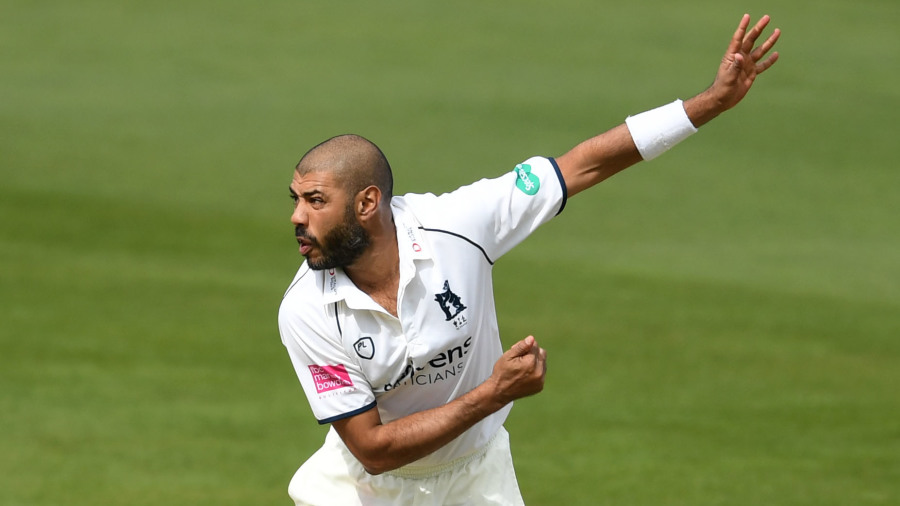
Nottinghamshire 97 (Patel 6-16) and 116 for 1 (Duckett 71*) trail Warwickshire 391 for 9 dec (Hose 111, Sibley 87) by 178 runs
Paul Farbrace addressed a Warwickshire members' forum following another refreshing day in a dreamily good week that made his appearance post-play feel a whole lot easier. These can be feisty occasions, but the new sport director has seen captain Jeetan Patel inspire victory over Surrey and now head towards a follow-up against Nottinghamshire. Supporters have evidence of a side moving forward.
If only head coach Peter Moores and director of cricket Mick Newell could say the same about Nottinghamshire. Their last Championship win came in June last year, and the failing batsmen have it all to do on the final day to avoid a ninth defeat in 12 four-day games. Had the head coach and director of cricket faced their own membership on Wednesday evening, observations would have been short, to the point and perhaps not especially polite.
A dismal trip has been salved so far only by the second-innings recovery engineered by Ben Duckett and Chris Nash after following on 294 runs behind. The first-innings total of 97 represents the lowest in the Championship this season and Nottinghamshire's worst against Warwickshire for 20 years. Not since 1988 have they scored fewer at Edgbaston. On that occasion a young blocker called Newell carried his bat for ten in an innings of 44. Would that his charges now had such tenacity.
Adam Hose, who completed his maiden first-class hundred in the first session, revealed that Warwickshire were not surprised at Nottinghamshire's collapse. "We felt they have been quite lackadaisical over the past couple of days so there was room for something like that," he said candidly. Bowlers were assisted by fine catching, a number of opportunities taken with deceptive ease.
Patel, 39, made his debut in New Zealand in 1999/2000, but in two full decades since he cannot have enjoyed such a run of form. Figures of 6 for 16 in Nottinghamshire's first innings gave him an aggregate of 75.4-39-105-18 in three innings taking in the Surrey win, the sort of numbers to recall cricket in the age of Queen Victoria. Visiting batsmen may be compliant, but Patel is combining the skill of a master technician with a fierce will to win.
That competitive drive went too far when he gave Steven Mullaney a send-off after the Nottinghamshire captain looped a catch to third slip. This proved to be merely the middle of a collapse which saw Nottinghamshire lose their last eight wickets for 28 runs. Umpires Tim Robinson and Martin Saggers stepped in to warn Patel, but the incident testified to continued ill-feeling between the sides.
Hose found himself the target of words en route to the century that enabled Patel to declare on 391 for 9, with James Pattinson the most culpable figure. At one point, Robinson shook his head aghast after a conversation with the Australian bowler. Pattinson may have harboured lingering frustration that an lbw appeal against Hose on Tuesday had been rejected. "There has been a little bit of spice through the whole game," Hose acknowledged with considerable understatement.
Patel's decision to bat on was vindicated with the addition of 80 runs. Fatigue from spending 146.5 overs in the field spanning three days, may have contributed towards Nottinghamshire's demise. Low confidence must have been another factor. But there was happiness as well as function in the first 90 minutes because no hundred this season will be celebrated as joyfully as the achievement of Hose, no greenhorn at 27.
On 98 he was struck on the helmet ducking into a short ball by Stuart Broad and underwent two statutory checks by the physio. When he swept Matt Carter for three he leapt into the air and punched his firsts before removing the helmet, no wound visible. "I am at that age where it was starting to bug," he said. "That constant question, not when it would come, but if it would. It meant quite a lot."
If Patel took the subsequent honours then Liam Norwell and Oliver Hannon-Dalby did the groundwork with their economy. Amazingly, 45 of the runs, nearly half of the total, accrued in three overs from Henry Brookes in which he over-stepped five times. He did tempt Duckett to chip to shortish mid on while clever use of the crease by Norwell persuaded Nash, who looked well set, to drive at a ball he ought to have left.
Patel needed only four balls to make an impression, Sam Hain reacting quickly at short leg when Joe Clarke pushed forward. From then on, variations of pace and use of the arm ball paid rich dividends. Tentative footwork cost Tom Moores and while the lower order opted for defence rather than counter-attack, that enabled Patel to build up pressure. Balls gripped and turned, but this was no minefield.
Hose is probably right to anticipate a tougher day as Warwickshire attempt to capitalise. "Duckett and Nash showed in the second innings that if you apply yourself, it is going to be hard work for us," he said, "but that is the game, and that is what we have got to do to win it."
Tagged under
Richard Gleeson four-for sets up tense final-day battle
Published in
Cricket
Wednesday, 05 June 2019 13:11
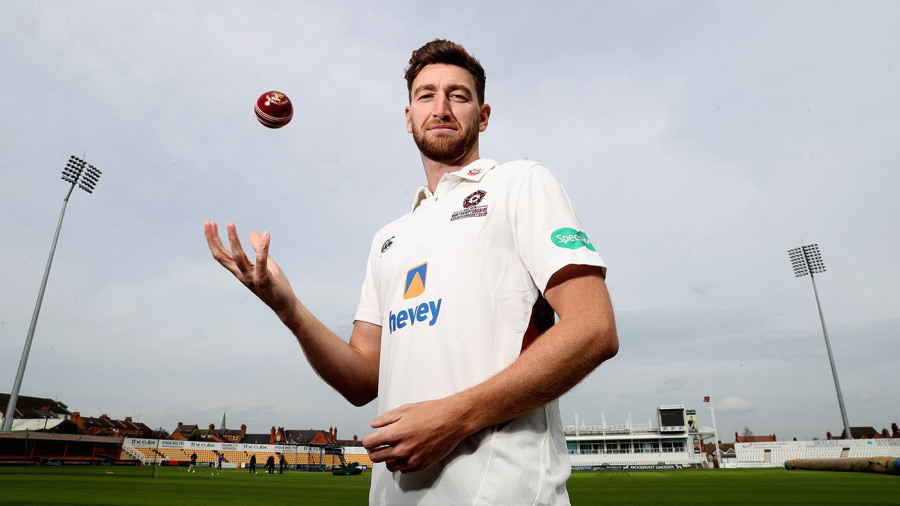
Leicestershire288 (Klein 87, Cosgrove 70, Gleeson 4-58) and 5 for 1 trail Lancashire 449 by 156 runs
Countrymen are wont to refer to a skulk of foxes but you will never find a side coached by Paul Nixon hiding itself away. Defeat is one thing; gutless capitulation another. So on an afternoon when Glamorgan went top of Division Two it was heartening to see another less fancied side taking to the barricades against the very warm title favourites.
Everywhere you looked in the final two sessions of this day you found foxes whose courage would have inspired John Masefield. Desperately placed on 82 for 5 at lunch, a score which had some home fans pondering a three-day finish, Leicestershire's lower order scrapped for every run and sold their wickets so dear that George Soros might have baulked at the price. The resistance was led by Dieter Klein, who was ninth out for 87, seven short of his career-best score, at the very point when his team had become favourites to save the follow-on. Klein was uncontroversially leg before to Richard Gleeson, and Leicestershire still needed another dozen runs to avoid one of cricket's most unpalatable invitations when Mohammed Abbas was caught behind by Dane Vilas without scoring.
Rather worse was to follow in the day's very last knockings as nightwatchman-opener Chris Wright was bowled by Graham Onions, playing no shot, for nought. All the same, if Paul Horton's men bat with the similar courage on the final day of this fine game they will collect five points for the draw and they will deserve them. We are set for another fine finish and another excellent advertisement for four-day cricket.
Yet such a prospect seemed distant indeed at lunch after a morning session in which the visitors had lost five wickets and may even have been comforted by the notion that things could have been so much worse for them. Both openers and Neil Dexter were removed by Onions and Tom Bailey with the new ball in little more than the first half hour of the day and suddenly the game became an 11 v 1 contest. Every shot, however secure, was accompanied by a cacophony from the slips, whose comments rang out across the bitterly cold air.
This was a session for the game's devotees but they needed to be properly insulated. Those at the River End huddled together like long-tailed tits on a branch in winter. It looked as though each spectator was giving his fierce attention to the game; well, either that or rigor mortis had claimed another scalp. Gradually Mark Cosgrove and Colin Ackermann began to make something of the innings, both batsmen punching fours through midwicket when the seamers searched too eagerly for an attacking length.
It remained cold. One fellow was seen unpacking a picnic and was generally judged to have lost his wits. This was a rug and Bovril day. After an hour's resistance Ackermann drove at Gleeson but only edged a catch to Vilas. Bury-born Harry Dearden lasted half an hour for his two runs but edged Liam Livingstone's final ball before lunch to Keaton Jennings at slip. The players went in and the sun came out. Aigburth became cricket's answer to the weather house.
Lancashire made further breakthroughs in the afternoon session but never as frequently as their supporters expected. The visitors' determination was epitomised by a 20-year-old debutant, Harry Swindells, who put on 50 for the sixth wicket with Mark Cosgrove. Swindells is slim, innocent and athletic, three adjectives which are rarely used in connection with Cosgrove. Yet the pair combined well and repulsed every Lancastrian challenge. The youngster's first runs were edgy in both respects but he soon warmed to his new environment and seemed unfazed by the yakking of Lancashire's close fielders. Indeed, Cosgrove was the first to depart when Onions brought one back off the pitch and had him lbw for 70. Swindells' first innings in his new surroundings lasted another half hour and he had accumulated a very respectable 37 when the ball ballooned off bat and pad and Keaton Jennings plunged forward from short leg to grab the catch which gave Livingstone his second wicket.
At that point Leicestershire were 150 for 7 and Lancashire had re-established their ascendancy. But the main battle had yet to be joined. It was led by Klein but he was ably assisted by Callum Parkinson, the twin brother of Lancashire's Matthew. For while Matt may be the better spinner, Callum has clearly secured a monopoly of the family's batting genes. In company with Klein, he added 119 for his team's eighth wicket. Neither the tea interval nor the taking of the new ball disturbed the pair; indeed it required a slightly generous leg before decision in favour of Gleeson to get rid of the other Parky for 37 when Leicestershire still needed 31 to avoid batting again tonight.
Lancashire's bowlers had become frustrated in the afternoon; perhaps they, too, were considering the attractions of a day off. But Gleeson recovered his discipline sufficiently to finish with 4 for 58 and set us up for a tense battle tomorrow. That is, if frostbite doesn't get us all first; but fingers are overrated anyway.
Tagged under
Rohit Sharma's best ODI innings, 'by far' - Virat Kohli
Published in
Cricket
Wednesday, 05 June 2019 13:21
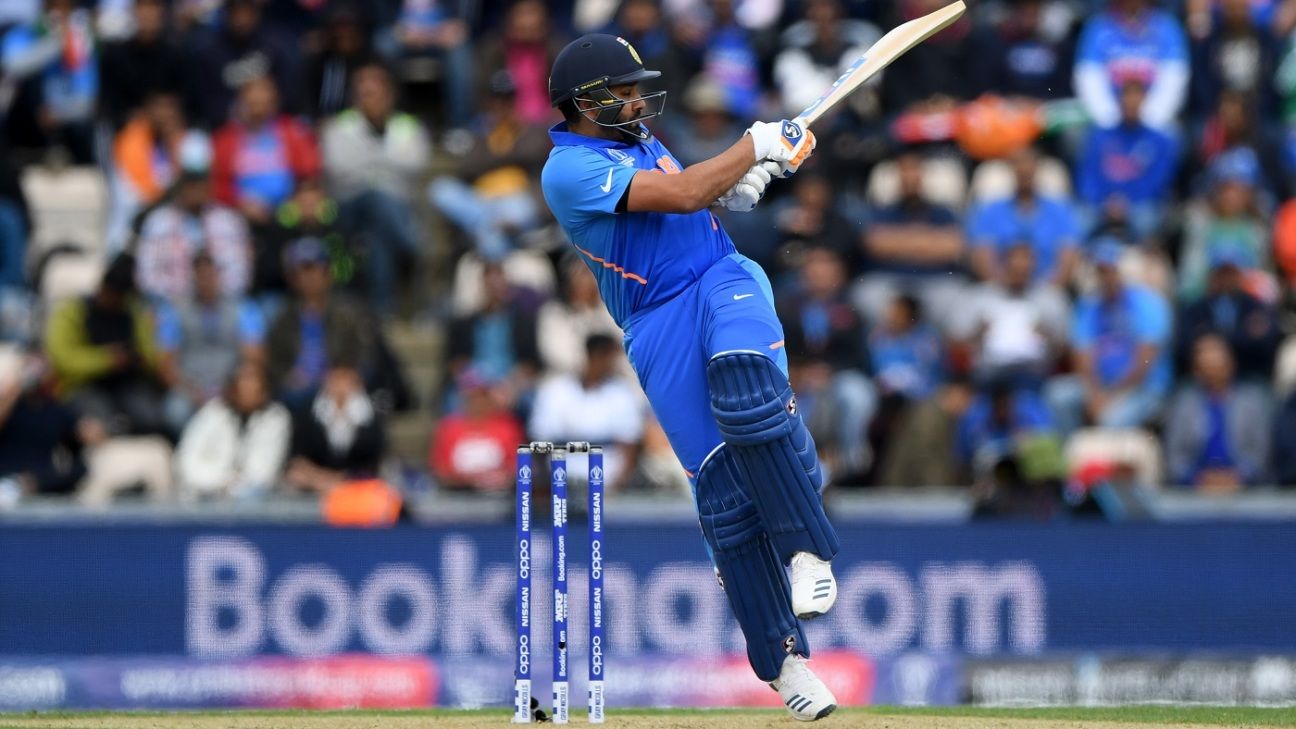
Rohit Sharma's century against South Africa in Southampton was the slowest of his ODI career. Yet, the timing, the composure and the manner in which he scored his runs prompted his captain Virat Kohli to label the century Rohit's "best ODI innings".
It is a significant statement by Kohli. Rohit has scored several centuries, including three double-tons, so what makes this one so special?
First up, Kohli said, there was the pressure of playing in the World Cup, and then the pressure of India needing to win their tournament-opener, in a format where each of their nine league matches will carry equal significance. "In my opinion this is by far his best ODI innings because of the kind of pressure the first game brings from a World Cup point of view," Kohli said at his post-match media briefing.
According to Kohli the goal set for the top order, comprising Rohit, Shikhar Dhawan and himself, was for one of the three batsmen to anchor the innings, bat deep, and build partnerships. After Dhawan and Kohli fell early, Rohit had to carry that responsibility.
The target was not steep, but the bounce was. South Africa fast bowler Chris Morris said there was "something in the pitch", which India's quicks, led by Jasprit Bumrah and Bhuvneshwar Kumar, exploited well. Even Hardik Pandya got one of his hard-length deliveries to climb awkwardly and hit Faf du Plessis' gloves.
"He [du Plessis] said it was like facing the first hour of a Test match," Morris said.
Kagiso Rabada and Morris attacked India's top order, bowling tight lines and pushing them on the back foot with good hard lengths. Rohit was lucky more than once to get away with balls pinging off his edge and gloves and landing away from the reach of the fielders.
Keeping the mounting challenge in mind, Rohit still managed to keep his head. "As a batsman when you go in and a few balls bounce like that, it is not easy to gather yourself again and play in a calm manner." Kohli said. "A lot of times batsmen tend to hit their way out of the situation. But he was very composed, he was very - he's played so many games, we expect a lot of maturity and a lot of responsibility from someone like him."
Even Rohit agreed that it was an atypical batting performance. "I couldn't play my natural game," Rohit said to the host broadcaster. "Certain shots that I love to play, I had to cut down and make sure that I play close to the body. I had to try and leave as many balls as possible in the initial spell. It was not a typical Rohit Sharma innings."
Rohit now is joint fourth among ODI centurions in chases. Kohli, who tops that list, said Rohit played the "perfect" innings. "In my opinion, of all the brilliant innings I have seen him play, I think this, for me, was the top of the pile because of the way he compiled his innings, and at no stage did we feel like, or he felt like he is going to throw it away.
"I think controlling the game so beautifully from one end and allowing the others to display themselves and string in small little partnerships, looking at the fact that they were only chasing 228, he played the perfect innings for that kind of a situation, on that kind of a wicket, against a bowling attack that was threatening to pick up wickets at any stage. So, yeah, in my opinion, by far his best knock."
Tagged under
'The guys are very disappointed and a bit angry' - Chris Morris
Published in
Cricket
Wednesday, 05 June 2019 13:28
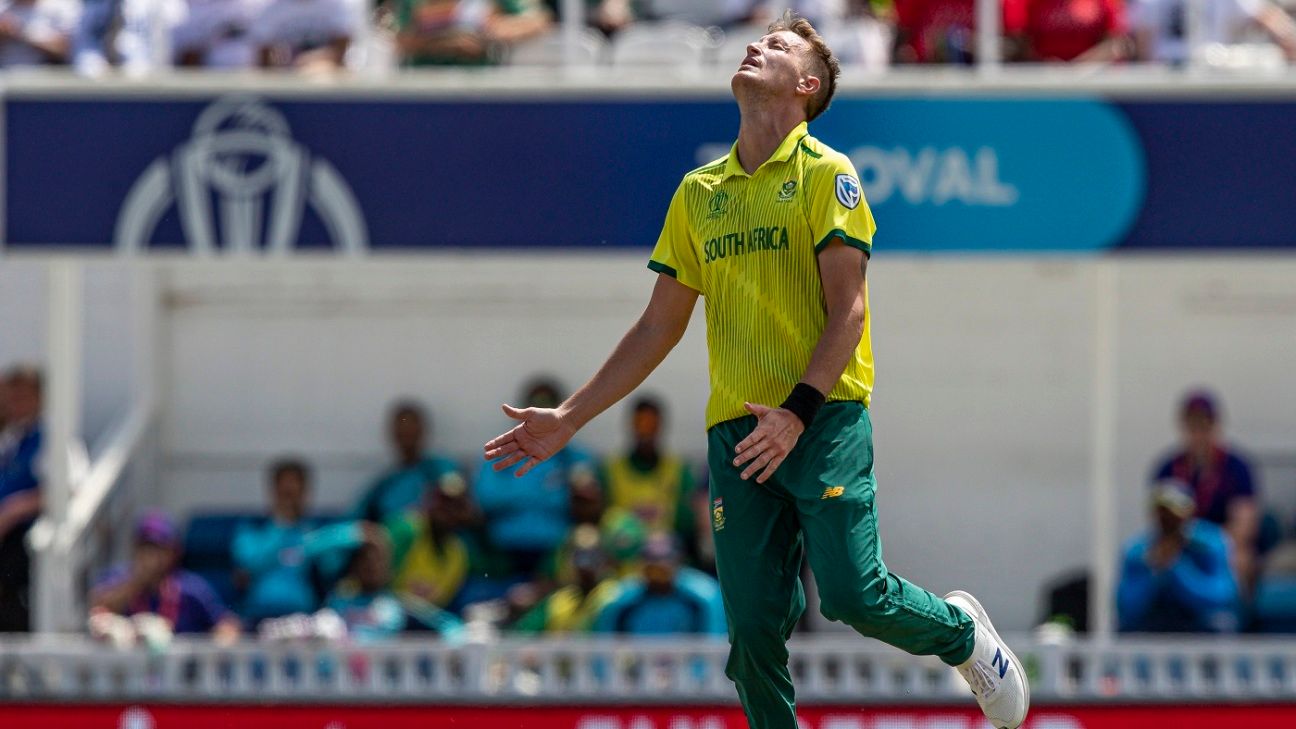
"Stranger things have happened," allrounder Chris Morris said. Following three defeats to begin the 2019 World Cup, this is what South Africa have to cling to, if they are to progress to the semi-finals.
ALSO READ - Bumrah, Rohit and Chahal give India winning start
Having arrived in the UK with the aim of winning at least six of their round-robin matches, they are now faced with winning six in a row to make that a reality. It is possible that even five wins could be enough to make it into the knockouts, or in an absolute best-case scenario, four. But although they've got the two favourites out of the way, they've still got to get past Australia, New Zealand, a possibly resurgent Pakistan (who is to tell if their upswing lasts), and West Indies.
"The guys are very disappointed and a bit angry, which they are allowed to be," Morris said after the loss to India. "We will sort that out in our heads tonight and when the sun comes up tomorrow we will go back to the drawing board and take on our next opponent. It's pretty simple - win the next six and crack on. Maybe we need a bit of luck to go our way."
Captain Faf du Plessis, who before the the match, spoke of his team as being one that already needed a psychological lift, has a tougher road ahead than practically any other captain in the competition presently. He blamed his batting order for the defeat.
"It's a change-room that is hurting," du Plessis said. "We're trying to make sure that we keep fighting, but we're still making mistakes all the time. Today was once again a great example of someone not batting through. That's what you need in England. You need one guy batting through. And then if you can get a total, your bowlers can try and put some pressure on. But to have so many 30s and 40s is not acceptable."
The only period of the game in which South Africa seemed to have a glimmer of a chance was the early overs of India's chase, as Kagiso Rabada delivered a furious spell of quick bowling. Twice he could have had Rohit Sharma - the eventual centurion - out, when short balls ballooned in the air off the batsman's bat and glove. One of those balls fell into space, however, and the other was spilled by a diving du Plessis, to reprieve Rohit on 1.
"He was a champion today," du Plessis said of Rabada. "He was extremely unlucky. I've never seen so many balls just fall in different areas. But sometimes, that's how the game goes. When you're not playing your best cricket, little 50-50 things go against you. We've got to try and make sure we turn those 50-50 chances towards us. But he was unbelievable today."
Tagged under
Cousins overcame urge to quit after quad injury
Published in
Basketball
Wednesday, 05 June 2019 14:13
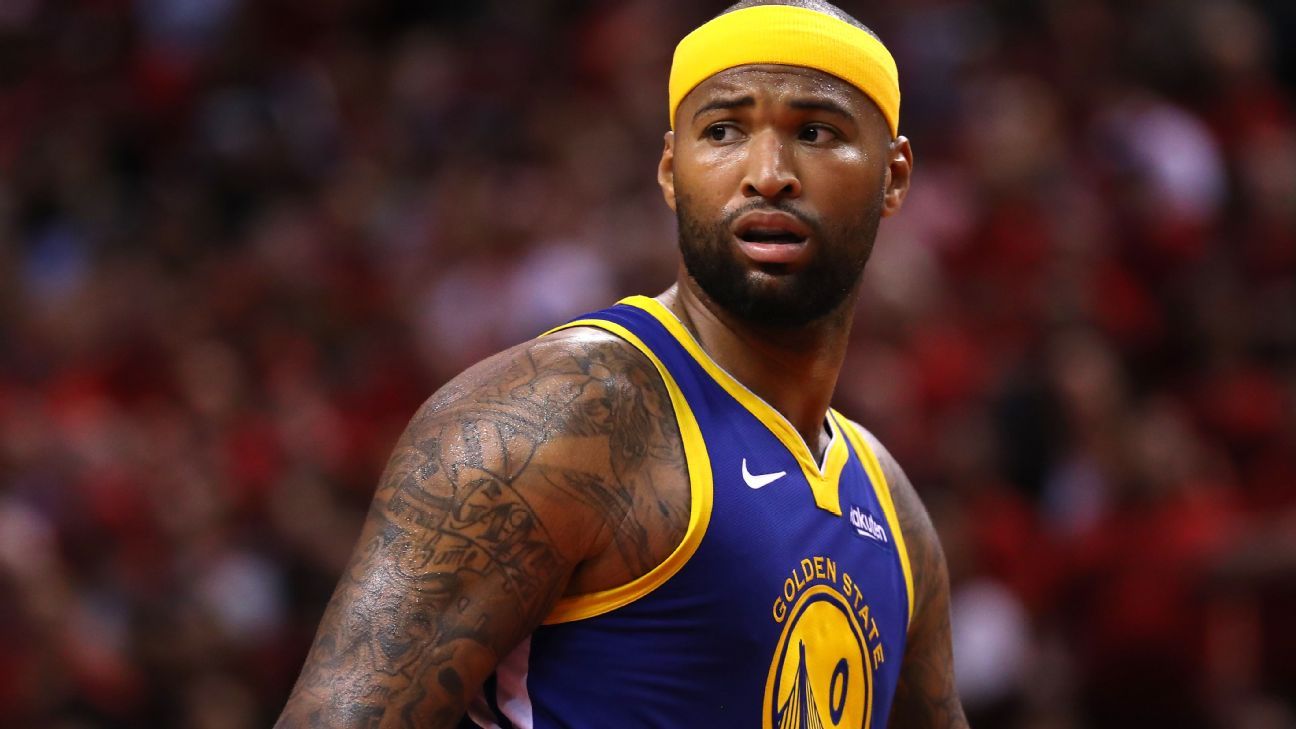
DeMarcus Cousins was devastated after tearing his quad in the first round of the playoffs, saying he was "just ready to quit." Luckily for the Golden State Warriors, he didn't.
Cousins, instead, has fought back to become a crucial piece for the Warriors as they enter Game 3 of the NBA Finals on Wednesday (9 p.m. ET, ABC) against the Toronto Raptors tied at one game apiece.
"I know the feeling of like, you know, this might be it. You know?" Cousins told ESPN's Rachel Nichols in an interview on The Jump on Wednesday. "So every chance I get to be on the floor, I'm gonna leave it on the floor. Because, you know, this is a game I've played my entire life and I've grown to love since I was a kid.
"And, you know, as much as I loved it then, I love it now. And I know how fast it can be taken away. It can be gone with the snap of a finger."
Cousins suffered what many within the organization feared was a season-ending quad tear in Game 2 of the Warriors' first-round series against the LA Clippers on April 15. And that was after he didn't play his first game of the season until Jan. 18 after spending almost an entire year rehabbing from an Achilles injury.
"I would be lying to say I didn't really have to [fight to get back so soon]," Cousins said of the quad tear. "Like, I had to dig deep. I had to do some soul-searching and, you know, throughout both injuries, it was times where I just -- you know, like, 'Forget it.' Like, I'll just take my time with it and whatever happens, happens. And f---, I just couldn't go out that way."
Cousins said he struggled to get into the right frame of mind to get back on the court.
"I was just ready to quit," Cousins said. "Like, throw the towel in. ... Human nature is the first thing. It's like, 'Why? Why me? Why now? What did I do wrong? Why do I deserve this?' And that's not always the case. It's usually [that] it's repaying you for the next moment.
"This is you putting your armor on. Slowly but surely. Because your next moment's gonna be even tougher."
After playing just eight minutes in Game 1 against the Raptors, Cousins started Game 2 on Sunday night and was a force, with 11 points, 10 rebounds and six assists in 28 minutes during a 109-104 victory.
"That's what it's about," Cousins said. "Leaving it all on the floor and trying to make the best play and the right play every possession. And I think we, as a team, did that in Game 2 and we were the better team that night."
ESPN's Nick Friedell contributed to this report.
Tagged under
The Kawhi pitch: Toronto's best case to keep its superstar free agent
Published in
Basketball
Saturday, 01 June 2019 10:53

What does Kawhi want?
This is the essential question that has occupied the Toronto Raptors since their bold trade for Kawhi Leonard last July. Leonard is one of the NBA's most inscrutable superstars, a man of few words and little subtext.
He's not uncommunicative, but he is quite literal. When he was asked after the Raptors' Game 2 blowout road loss to the Milwaukee Bucks, "Where do you go from here?" Leonard replied, "To Toronto for Game 3." This isn't a player interested in disseminating messages in the media to convey his feelings or leverage his power.
For NBA teams, trafficking in superstars is a two-part process -- acquisition, then retention -- and it's that latter stage that presents the greatest challenge. Any front office with the requisite assets can trade for a superstar, but only one skilled at the art of persuasion can keep him. Tied 1-1 with the Golden State Warriors in the NBA Finals (Game 3, 9 p.m. ET on ABC), the Raptors will soon shift their attention to the retention project they've been planning for nearly a year -- signing Leonard to a long-term contract in free agency to remain in Toronto.
How do you sell someone not easily sold? How do you sculpt a pitch about external factors when the target of that pitch is someone so internally focused? What can you really offer that other leading NBA organizations can't? How can the Raptors compensate for their geographic disadvantage to a team like the LA Clippers in recruiting a Southern Californian whose preference for temperate climes is well-known?
The Raptors executed the trade last summer with the belief that, when it came time to make their sale to Leonard, they'd be a strong incumbent with a track record of competence and achievement. This is the case Toronto can make to Leonard with confidence.
Kawhi:
When we started crafting our pitch to you to make the Raptors your long-term home, we realized that the most important considerations aren't necessarily the things we think we do well as an NBA franchise, but the things you believe are most important as an NBA superstar. This decision is about both your professional and personal lives, and it's the first real opportunity you've had to choose a home with no restrictions.
Your honesty is one of the qualities we most admire in you, so in identifying the factors we feel at work in this decision, we'd be smart to take you at your word. We think about your introductory news conference from last September, when you were asked what you want most to accomplish in your NBA career.
You responded, "Just be able to be healthy. That's my No. 1 goal -- play a long, healthy career, be able to be dominant wherever I land. That's about it. I want to win championships and get in those record books."
You're a rare breed -- a player who is well-aware of his greatness, but who also appreciates the limitations of a human body against the grueling NBA schedule. That's why when you arrived in Toronto, you clearly articulated your expectations: A commitment to your physical health was what you wanted from our organization this season, above all else. That meant a coordinated effort in which every stakeholder -- you, our front office, our coaching staff, our medical team, those you trust to advise you -- would work toward that common goal.
It's fair to say that, over the past year, Kawhi Leonard and the Toronto Raptors together created a new template for the NBA. You know as we do that what was referred to casually -- and often dismissively -- in the media as "load management" was so much more than your finding rest on back-to-back stretches. It was a collaborative and thoughtful process befitting of an athlete who plays with uncommon magnitude and force, whose every movement on the court is a portrait of intention.
You teamed up with our director of sports science Alex McKechnie, physiotherapist Amanda Joaquim, as well as others in our organization, and methodically navigated your output to perfection. When you said in March that the NBA's regular season was "82 practices," we fully embraced that characterization, just as we endorsed your larger approach. McKechnie, for years, has been at the forefront of this performance movement, and we consider your partnership with him an achievement.
We're a forward-thinking NBA franchise that understands that there are many reasons you've been the MVP of the 2019 playoffs -- your talent, preparation, temperament. But there's also your devotion to best practices. We look at an otherworldly superstar like James Harden and wonder had he not crossed the 3,000 minute threshold sometime during Game 4 of the Rockets' first-round series -- a multiyear pattern for him -- whether we'd be facing Houston and not Golden State in the Finals.
There are stars, front offices and coaches who reject this thinking, who reside in an old-world sensibility where toughing it out in a "man's league" is the dominant worldview. Not us. Like you, we appreciate that every small decision is part of a much larger whole. There's no one game, single practice or individual workout that stands apart from the greater goal of winning a championship; every choice impacts the greater outcome.
Watching you go about your business on a daily basis has been a revelation to us. From the moment you arrive at the facility, it's an exercise in machine-like efficiency: weights, shots, medical, film, practice, ice, and whatever else your preparation demands. Not a moment or movement wasted. And it's not simply that we admire how you put in a day's work -- we've learned from it. You made us aware early on that you're a player accustomed to structure, and we listened. As a result, we're a better basketball operation today than when you arrived, something that has been borne out this spring.
Our head coach, Nick Nurse, has won at every level throughout his career -- but more importantly, he's a listener. When you asked questions about defensive rotations or coverage schemes, we explained that our principles of ball pressure and getting in gaps were less specific in their directives, but over the course of the regular season and playoffs, we melded our approaches. In doing so, we extinguished the East's top-ranked offense, rendering it impotent in a six-game series.
On the other end, we installed an offense that both maximizes the collective intelligence and inherent unselfishness of our unit, but also empowers your exceptional individual skill set. We've worked with you to put you in the best position to succeed on a given possession by furnishing you with the brightest teammates who intuitively understand where, when and how you like the ball. While we respect that you'll survey the field for other franchises with talent, we are steadfast in our belief that you will not find another roster with more professionalism, experience and unselfishness. Nor will you find a collection of teammates with a willingness to defer to your dominance at the biggest moments, while doing all the little things required for you to succeed in those moments.
We have veteran players who still have productive seasons ahead, and young players who are only going to get better, including Pascal Siakam, who is projected to walk away with the league's Most Improved Player award in a landslide. We selected him with the 27th pick, just as we have overperformed with so many of our younger players: We stole Norman Powell from Milwaukee by sending out Greivis Vasquez, found OG Anunoby with the 23rd pick, and picked up off the scrap heap an undrafted Fred VanVleet, who has been crucial in helping you win the biggest games in Raptors franchise history.
We could tell you why we think Toronto is the greatest basketball city on the continent, how being the face of a truly national franchise is a privilege, but we also know that you might value the strengths of our market differently than others. We appreciate that peripherals aren't as important to you, but we know that a professional workplace devoid of external noise is. And we present the events of the last 10 months as evidence that, in this respect, the Toronto Raptors are a perfect fit for Kawhi Leonard.
An NBA team with a pending free-agent superstar can be beset by intrigue and disruption, but despite the uncertainty about your future, our season together was devoid of high drama. That's a testament both to your character and our commitment to doing things the right way: We didn't succumb to distractions because, together, we simply wouldn't allow it. If there's an organization that has produced a more harmonious season of basketball in recent years with such uncertainty, we haven't seen it. This wasn't a fluke; we believe it is -- and will be -- a fundamental feature of the Toronto Raptors in a Kawhi Leonard Era.
But more than anything, our boldest selling point is you -- specifically, our decision last summer to change the course of our franchise in an effort to make you a Toronto Raptor. Our rivals in the Eastern Conference had greater resources and assets necessary to acquire you. We can't say why they didn't. Perhaps they didn't believe you could restore yourself to full health, or you weren't worth their best prospects. Maybe they didn't have sufficient faith that the overall quality of their organization would be enough to convince you to stay.
We took the risk they didn't, not only because we were confident you'd find the conditions for both health and on-court success to be present in Toronto, but because we also understood that you would make us a better NBA franchise -- you would make us the kind of organization that would be the best long-term home for Kawhi Leonard.
Coming soon: The case for the Clippers
Tagged under
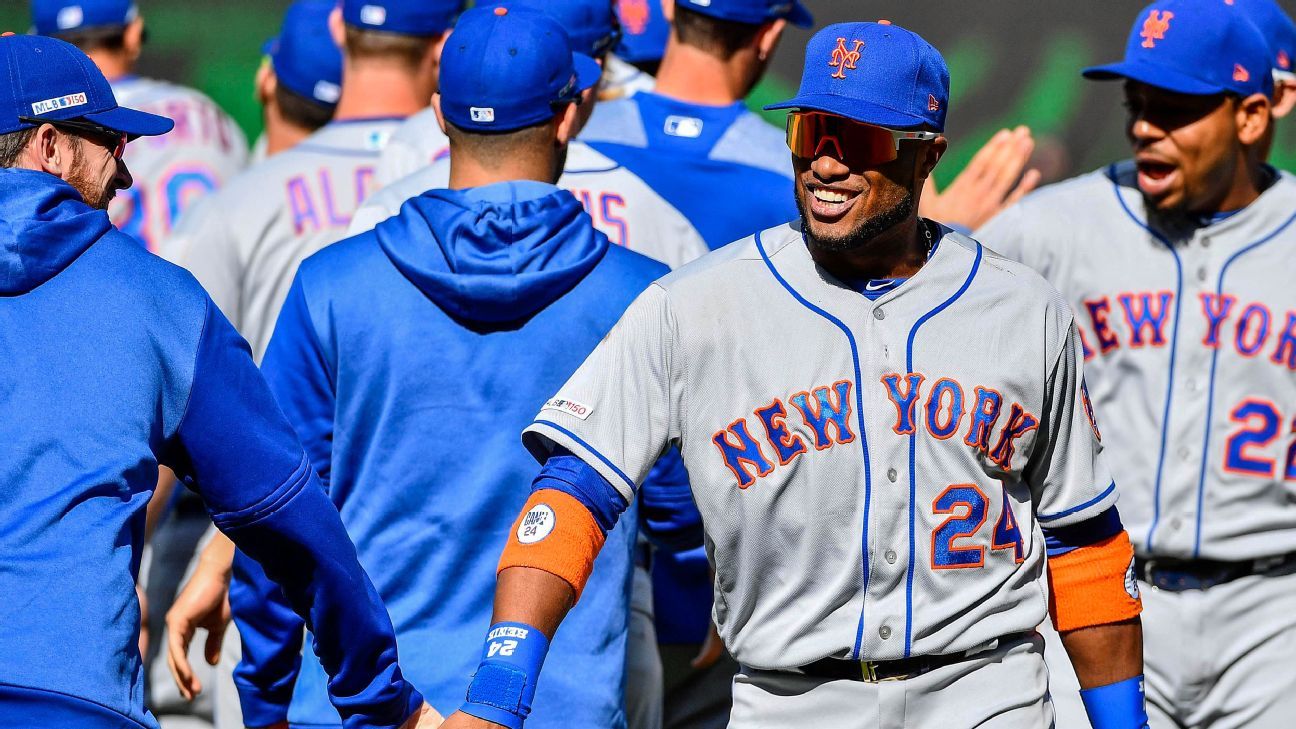
NEW YORK -- The Mets have activated All-Star second baseman Robinson Cano from the injured list.
Cano was set to bat third for New York against the San Francisco Giants on Wednesday night. He has been out since May 22 with a strained left quadriceps.
He said Sunday that he hoped to be active for the series opener Tuesday, but he was held back an extra day.
Acquired last offseason from Seattle, Cano is hitting .241 with three homers and 13 RBIs for New York. He has been criticized for failing to hustle on a few groundouts this season then was injured running one out.
Outfielder Aaron Altherr was designated for assignment to open a roster spot.
Tagged under




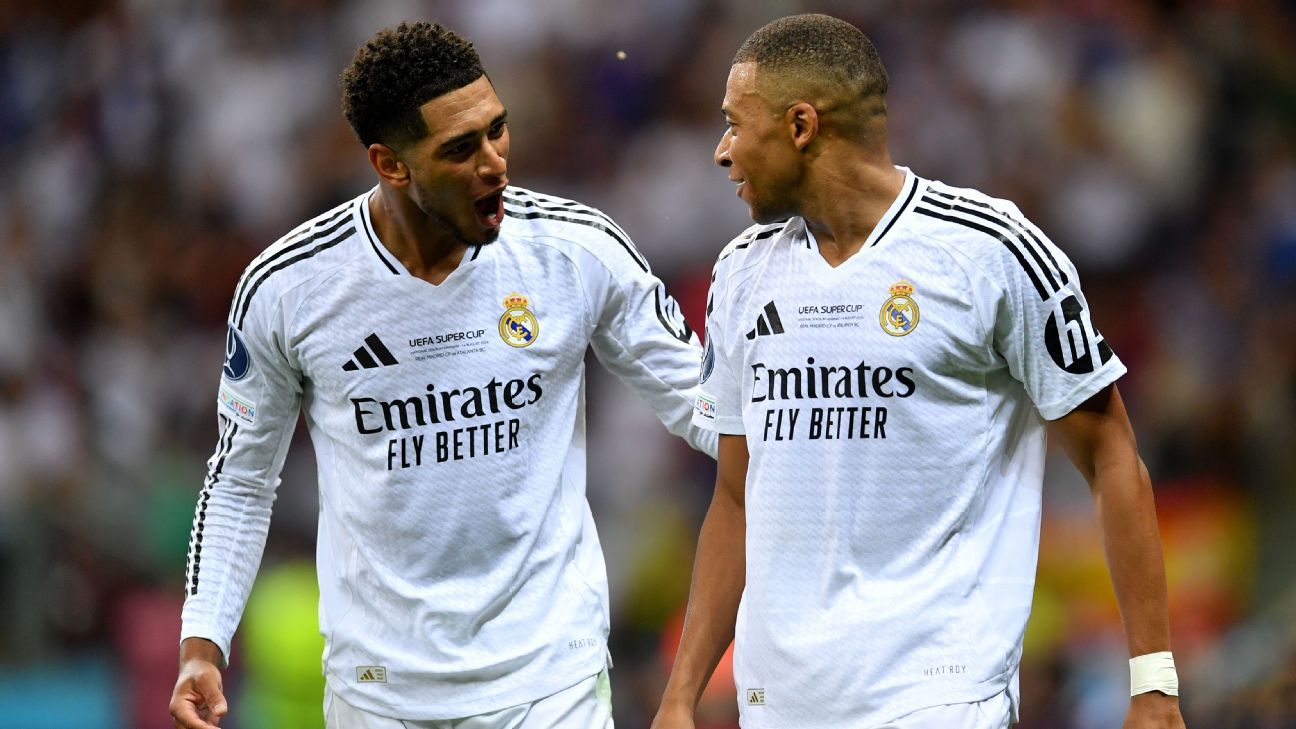










 Phone: (800) 737. 6040
Phone: (800) 737. 6040 Fax: (800) 825 5558
Fax: (800) 825 5558 Website:
Website:  Email:
Email: 






